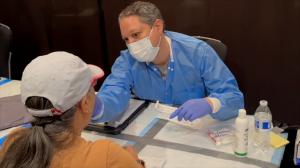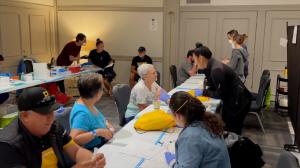MauiWES to hold final recruitment events, transition to monitoring participants
University of Hawaiʻi at MānoaLink to video and sound (details below): https://spaces.hightail.com/receive/rk6Znhv8Pw
***SUGGESTED VOSOT SCRIPT BELOW***
Maui residents have one last opportunity to be part of a comprehensive social and health screening effort to document the short and long term impacts of the deadly 2023 Maui wildfires.
The University of Hawaiʻi at Mānoa’s groundbreaking Maui Wildfire Exposure Study (MauiWES) will host its final recruitment events on February 7 and 8, at the Lahaina Comprehensive Health Center.
Participants need to be 10 years or older and have resided or worked in or near the affected area by the wildfires in August 2023. Attendees will complete a survey and health exam, and provide clinical samples to detect metals and other fire-specific contaminants. No insurance is required. Participants will be compensated $100 and receive their test results the same day.
Since the study kicked off in January 2024, researchers have recruited more than 1,920 participants and are expected to eclipse their goal of 2,000 following the February events. So far, more than 780 participants have followed up with a healthcare provider, 722 participants have made lifestyle changes after receiving their results, and more than 300 have accessed mental health services, based on MauiWES estimates.
“The response from the Maui community has been truly inspiring,” said Ruben Juarez, UH Economic Research Organization (UHERO)-HMSA Distinguished Endowed Professor of Health Economics and one of the study’s leads. “With nearly 2,000 residents participating, this study has not only exceeded expectations but has already made a real difference in people’s lives—hundreds have taken steps toward better health, from following up with providers to making lifestyle changes and accessing mental health support. This incredible engagement reflects the strength and resilience of our community.”
Following these events, the team, led by Juarez and Professor Alika Maunakea of the Department of Anatomy, Biochemistry and Physiology at the UH Mānoa John A. Burns School of Medicine (JABSOM), will focus on monitoring the participants annually for at least the next 10 years to see how the wildfires have affected their mental and physical health.
“While there is still much work ahead, we are optimistic about the future and committed to ensuring that this research leads to lasting improvements in health and well-being for the people on Maui,” Maunakea said. “We are deeply grateful for the trust and commitment of every participant, and we look forward to continuing this journey together toward long-term healing and recovery.”
The study expanded enrollment to include children aged 10 and older after receiving an additional $2.3 million in state funding and a commitment from the National Institute on Minority Health and Health Disparities in September 2024 to support the long-term assessment. Researchers are particularly focused on understanding the potential long-term health effects on younger survivors.
MauiWES impact
In May 2024, MauiWES published one of the most comprehensive reports to date on the social and health impacts of the wildfires. The MauiWES interactive dashboard continues to be a vital resource, offering real-time data and insights for the community and stakeholders.
This public impact research project is the result of an ongoing partnership among UHERO, which is housed in the UH Mānoa College of Social Sciences, JABSOM and UH Maui College.
Link to video and sound (details below): https://spaces.hightail.com/receive/rk6Znhv8Pw
VIDEO:
BROLL: (1:45)
0:00-1:45 - Video of previous MauiWES recruitment events
SOUNDBITES:
Ruben Juarez, UHERO Professor and MauiWES co-lead
(0:18)
“What we are seeing is that we're providing results that are not typically available in the doctor's office, including heavy metal contaminants that individuals may have been exposed or re-exposed. So we’re hoping that we provide those results to all participants as well as a consultation on the day of.”
(0:14)
“We’re learning some really important facts about how the fires impacted the entire population, and by you coming to the study, you are not only getting valuable information for yourself but you’re actually getting information that is helping the entire community.”
VOSOT SCRIPT
INTRO:
Maui residents have one last chance to take part in a major health study tracking the long-term effects of the 2023 wildfires.
VO:
The University of Hawaiʻi’s Maui Wildfire Exposure Study is holding its final recruitment events on February 7 and 8 at the Lahaina Comprehensive Health Center.
Participants must be at least 10 years old and have lived or worked near the fire areas.
They’ll complete a survey, health exam and provide clinical samples—no insurance needed.
Each participant gets $100 and same-day test results.
Everyone must register on the Maui Wildfire Exposure Study website.
SOT:
Ruben Juarez, UHERO Professor and MauiWES co-lead
“What we are seeing is that we're providing results that are not typically available in the doctor's office, including heavy metal contaminants that individuals may have been exposed or re-exposed. So we’re hoping that we provide those results to all participants as well as a consultation on the day of.”
VO:
Since the study launched last January, they have almost reached their goal of 2,000 participants.
Following these events, the team will focus on monitoring the participants annually for at least the next 10 years to see how the wildfires have affected their mental and physical health.


